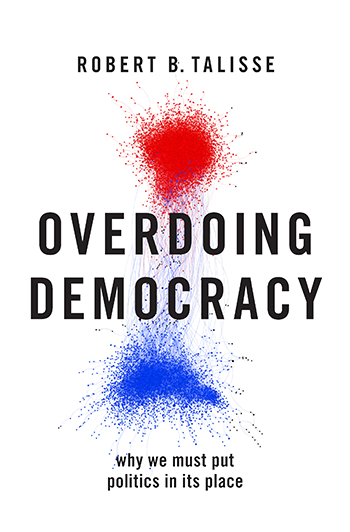When Kate was growing up, her grandfather often told her that when he was serving on a Navy ship during WWII, there were two things he and his fellow sailors never talked about: religion and politics. In the present age, we're apt to think that leaving politics off the table like that is inauthentic, or worse, a sign of being an insufficiently engaged citizen. We're apt to think that the more we do politics, the better the health of our politics. My guest would say that the opposite is true. His name is Robert Talisse, and he's a professor of political philosophy and the author of Overdoing Democracy: Why We Must Put Politics in Its Place.
When Kate was growing up, her grandfather often told her that when he was serving on a Navy ship during WWII, there were two things he and his fellow sailors never talked about: religion and politics.
In the present age, we're apt to think that leaving politics off the table like that is inauthentic, or worse, a sign of being an insufficiently engaged citizen. We're apt to think that the more we do politics, the better the health of our politics.
My guest would say that the opposite is true. His name is Robert Talisse, and he's a professor of political philosophy and the author of Overdoing Democracy: Why We Must Put Politics in Its Place. Today on the show, Bob and I discuss how democracy isn't just a system of government but a moral ideal; how the fact that it's an ideal gives it a tendency to extend its reach; and how the particular circumstances of modern times have extended that reach into all of our lifestyle choices, from the car we drive to where we shop. But, Bob argues, there can be too much of a good thing. He says the way politics has saturated everything in our lives creates some negative effects, turning politics into something that parties can market like toothpaste, and making each individual's views more extreme, so that we ultimately get to the point that we can't see our political opponents as people who have an equal say in our democracy. The solution, Bob says, is not to build bridges of dialogue with our political opponents, as is so often advised, but to engage with people in spaces, places, and activities where doing politics isn't the point, and you don't even know the political views of the people with whom you interact.






Listen to the episode on a separate page.
Subscribe to the podcast in the media player of your choice.
Listen ad-free on Stitcher Premium; get a free month when you use code "manliness" at checkout.